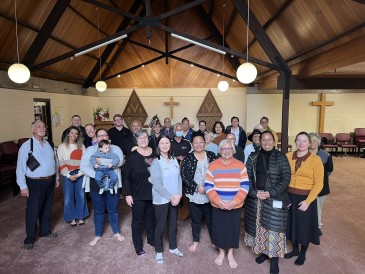
If you’re at the Gisborne Hospital on a Thursday morning, you’ll be greeted by the sound of Health NZ Te Whatu Ora Tairāwhiti’s songbirds.
Matua Owen Lloyd has been running waiata for over 20 years and he’s always welcomed anyone who steps through the chapel – whether you’re staff, a patient, or a member of the public drawn to the music.
“It’s about time out for staff, it’s an hour of ‘me time’ to enjoy socialising and connection through song and music,” says Owen.
He sees the importance of waiata and the feeling it creates for all participants.
“This is a way of safely imparting Te Reo Māori me ona tikanga. It’s a way of holding steadfast to our reo.
“We have a lot of non-Māori staff so making them feel safe in an environment that they may not have been exposed to in their lives is paramount.”
Matua Owen wanted to acknowledge Papa Taina Ngarimu, Mere Wawatai Dave Para, and Molly Para for their ongoing support and for ensuring waiata continues to be the welcoming space it is for kaimahi and manuhiri.
Community physiotherapist, Tracy Royston, has been consistently attending waiata for over 10 years and has an important role as kaea (leader of waiata).
Tracy enjoys the inclusiveness of our whānau hōhipera, our whānau turoro, our whānau hāpori, and being together in one space to share, support, laugh, cry, acknowledge one another just for that short time once a week.
“I was very nervous and felt vulnerable in that space being pākehā and knowing no waiata. However, I did feel confident with my voice and I love music and singing, so I knew I wanted to be present and learn.
“Committing to regular attendance has not only allowed me to learn many waiata, haka, mōteatea, and himene, but the connections and friendships I have made over the years have been awesome.”
Lead guitarist, Bill Morris, orderly, has been with the waiata group for over 10 years and commits to attending for mental health.
“When you get to waiata, ego is left at the door and you’re fully immersed in the atmosphere,” said Bill.
Comments from participants include how after waiata they feel energised for the day, they see it as a cup filler, and another participant mentioned how waiata was an incentive for them working at the hospital.
“I want to ensure I keep it alive and keep it going,” adds Owen.
Waiata is held Thursday’s in the chapel, 9am – 10am. Nau mai haramai koutou kātoa.
